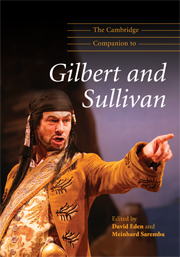Book contents
- Frontmatter
- Part I Background
- Part II Focus
- Part III Reception
- 11 Topsy-Turvy: a personal journey
- 12 Amateur tenors and choruses in public: the amateur scene
- 13 Champions and aficionados: amateur and listener experiences of the Savoy operas in performance
- 14 ‘How great thy charm, thy sway how excellent!’ Tracing Gilbert and Sullivan's legacy in the American musical
- 15 ‘See how the Fates their gifts allot’: the reception of productions and translations in continental Europe
- Part IV Into the twenty-first century
- Appendix 1 Who wrote the overtures?
- Appendix 2 Stage and choral works by Arthur Sullivan and W. S. Gilbert
- Appendix 3 Modern editions of works by Arthur Sullivan and W. S. Gilbert
- Appendix 4 Sullivan's archetypes of English opera
- Notes
- Bibliography and further reading
- Index
- Plate section
13 - Champions and aficionados: amateur and listener experiences of the Savoy operas in performance
from Part III - Reception
Published online by Cambridge University Press: 28 September 2011
- Frontmatter
- Part I Background
- Part II Focus
- Part III Reception
- 11 Topsy-Turvy: a personal journey
- 12 Amateur tenors and choruses in public: the amateur scene
- 13 Champions and aficionados: amateur and listener experiences of the Savoy operas in performance
- 14 ‘How great thy charm, thy sway how excellent!’ Tracing Gilbert and Sullivan's legacy in the American musical
- 15 ‘See how the Fates their gifts allot’: the reception of productions and translations in continental Europe
- Part IV Into the twenty-first century
- Appendix 1 Who wrote the overtures?
- Appendix 2 Stage and choral works by Arthur Sullivan and W. S. Gilbert
- Appendix 3 Modern editions of works by Arthur Sullivan and W. S. Gilbert
- Appendix 4 Sullivan's archetypes of English opera
- Notes
- Bibliography and further reading
- Index
- Plate section
Summary
‘When you go home at night, it's still swimming around in your head. And when you wake up in the morning, the tunes are still there, you know. And I suppose there could be worse things in your head’, says a member of the Edmund Rice Choral and Musical Society (ERCMS), interviewed in August 2001. ‘I enjoy it when it's on, but I'm also glad when it stops and my life's my own again. I feel I can go and cut the grass, or do the mundane, ordinary things that just get left.’
The Savoy operas occupy a unique place in English performing history as a self-contained genre of light-hearted, accessible (though not always easy) tonal music with plenty of chorus involvement, solo parts of varying dimensions, and (in most cases) a guaranteed happy ending. For decades they have provided amateur performing groups with a reliable formula for fun in rehearsals and popularity with audiences. Out of copyright and with relatively straightforward costume and staging requirements, performing Gilbert and Sullivan is a reasonable aim for amateur groups, and one which musical societies from around the UK and further a field celebrate at the annual Gilbert and Sullivan Festival in Buxton, Derbyshire. An empirical study of audience and performer experience at the 2001 festival considers the impact of the Savoy operas on the individuals participating there and on amateur performing culture as a whole.
- Type
- Chapter
- Information
- The Cambridge Companion to Gilbert and Sullivan , pp. 190 - 200Publisher: Cambridge University PressPrint publication year: 2009
- 1
- Cited by



